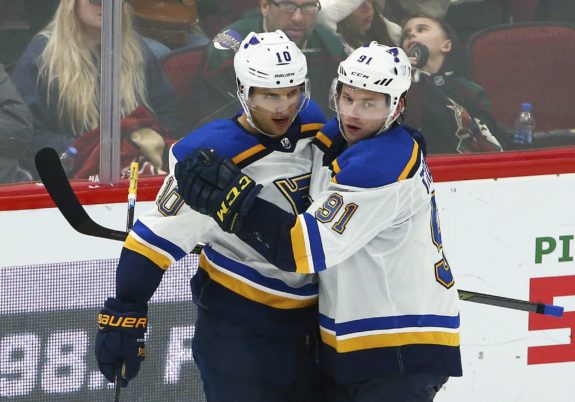The 2018-19 St. Louis Blues won the Stanley Cup Championship, the first in the history of the franchise. But, naturally, some players made a bigger contribution than others. In this series, we’ll look at the Blues’ star players, and see who made the grade and who needs to retake the test.
When the St. Louis Blues acquired Brayden Schenn from the Philadelphia Flyers at the 2017 NHL Draft, they believed they’d bought a top-six difference maker who didn’t have a clear role on his current team. In the following season, Schenn proved them right, smashing a career high with 70 points in 82 games, leading the team.
In his second season with the team, he was once again in a new role. Ryan O’Reilly arrived in the offseason, making Schenn no longer the team’s primary center. Through a series of stops and starts, he began to settle into his role. But did he remain the impact player he’d been in 2017-18?
New Role for Schenn
Last season, when they were hot, Schenn formed one of the most formidable lines in hockey with Jaden Schwartz and Vladimir Tarasenko. Schenn and Schwartz, both Saskatchewan natives, formed a particularly tight bond, and the two fed each other to career highs in points per game. But entering the 2018-19 season, Schenn was in a new role. The lineup wasn’t settled, and he wasn’t able to form that chemistry with anyone quickly.

To make matters worse, Schwartz struggled right out of the gate this season, recording only nine points before he was injured late in November. Without his red hot, trusty winger, Schenn struggled to find his groove. Even so, his output was respectable. Through 20 games, he put up 14 points. It wasn’t a bad start, but nowhere near mirrored the 30 points he put up through two months the season before.
That became the tale of Schenn’s entire campaign. It was a period of adjustment and coming down to earth. He wasn’t in as central a role, so his time on ice dropped by over a minute per game. His stick wasn’t as hot, as his shooting percentage dropped almost three percent. Most notably, his power play time diminished. With O’Reilly now earning the first line opportunities, Schenn’s role dissipated, and he dropped from 19 power play points the season before to just 12 in 2018-19.
By season’s end, he had steadied himself substantially, partially because the Schwartz-Schenn-Tarasenko line was reunited and finding chemistry. From February on, he was exactly a point per game player, putting up 27 points in 27 games. That gave him a grand total of 54 points on the season; respectable, but a significant drop-off from the 70 he posted the season before. Though he missed 10 games with injury, he was a lot closer to the player he was his final season in Philadelphia, when he posted 55 points in 79 games.
Playoff Disappearance
Had that been the end of the Blues’ season, Schenn’s performance would have been disappointing, but not alarmingly so. Unfortunately, he then disappeared during much of the playoffs.For the first four games of the postseason, Schenn was pointless and minus-three in plus-minus. Then he heated up for a period, collecting four points in three games, the final two in Round 1 and the first game in Round 2.
Then the drought began. For eight straight games, Schenn did not record a single point, despite never receiving fewer than 17 minutes of playing time. It was a worrying disappearance, and part of why the Blues struggled to put away the Dallas Stars any sooner. Fortunately, he returned to form closer to the end of the playoffs, scoring his first point in nine games with a critical power play goal that would send Game 3 of the Western Conference Final, the infamous “hand pass” game, into overtime.
From then on, Schenn was much more the player that Blues fans had come to expect. He recorded seven points in the final 10 games of the postseason, going plus-four in that time. He even notched the third goal in Game 7 of the Stanley Cup Final, and was plus-two, helping the franchise capture its first ever Stanley Cup. He finished the postseason with a total of 12 points in 26 games, a significant recovery, but not enough for a top-six threat.
Analysis
If Schenn hadn’t set such a high bar for himself with his incredible first season in St. Louis, this review would be more positive. 54 points in 72 games is hardly paltry, and the point per game pace he finished on redeemed his regular season significantly.

However, he did largely disappear early in the playoffs. If the Blues had bowed out in the first or second round, Schenn would have been a major reason why, and fans might have been calling for a trade this summer with one year left on his contract. Fortunately, other players stepped up and buoyed the Blues through the first two rounds, before Schenn regained his form and contributed in the second half.
In that way, his regular season and postseason mirrored each other substantially. Looking back, the output was fine. But a closer look reveals a streaky player who disappeared for significant stretches. An unrestricted free agent after the upcoming season, Schenn will want to ensure that he more closely resembles the player from 2017-18 than from 2018-19, although the latter season did result in his achieving the ultimate hockey dream.